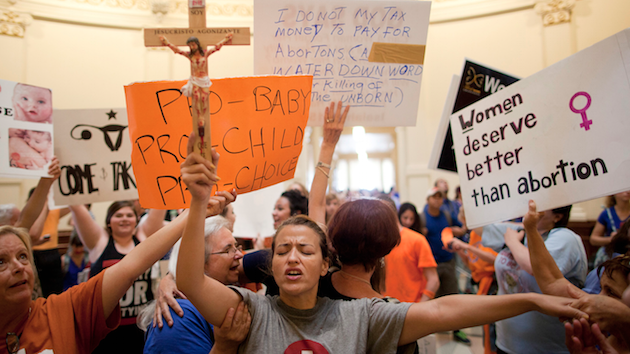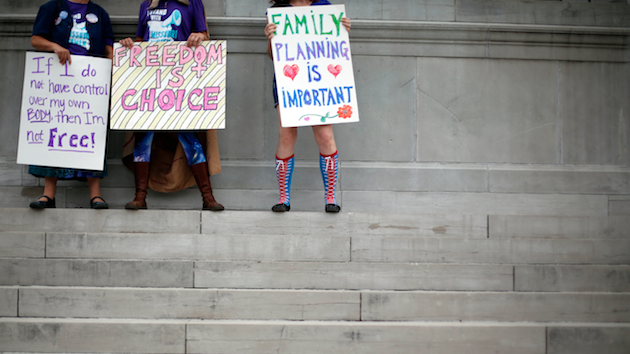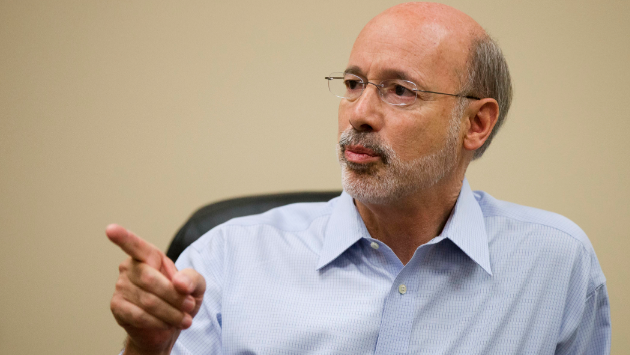
Tamir Kalifa/AP
States have approved more anti-abortion measures during the past three years than during the entire preceding decade. And this fall, voters themselves will also have the chance to decide whether to approve or block extreme anti-abortion ballot initiatives in three states. Ballot measures in Colorado and North Dakota would effectively ban abortion by defining personhood as beginning at conception, and a constitutional amendment in Tennessee would allow the state legislature to pass draconian anti-abortion laws, including a ban. Here’s a look at those ballot initiatives:
Colorado’s Constitutional Amendment 67: This ballot measure would amend Colorado’s constitution to define a fetus as a person under Colorado’s criminal code, a change that opponents say would make any abortion a crime, including in cases of rape and incest, and when the health of the mother is endangered.
Supporters of the amendment, including Personhood Colorado, the group backing the ballot measure, say it has nothing to do with abortion, but rather is designed to ensure that those who harm an unborn child in any manner will be prosecuted. The woman who initially pushed for the measure is Colorado resident Heather Surovik, whose fetus was killed by a drunk driver. The driver pleaded guilty to vehicular assault and driving while intoxicated, but because under Colorado law an unborn child is considered part of the mother’s body and not a separate person, he was not charged with killing the fetus.
“Amendment 67 corrects the loophole in Colorado law and ensures that those criminals can be charged with killing a child in many different scenarios,” Jennifer Mason, a spokeswoman with PersonhoodUSA, told the Washington Post in August.
Reproductive rights advocates say baloney. The “Vote No on 67” campaign, a broad coalition of organizations including the ACLU of Colorado, the Colorado Bar Association and NARAL Pro-Choice America, note the amendment would “give legal and constitutional rights to a woman’s fertilized egg,” making criminals out of women who seek abortions and the doctors who perform them. Amendment 67 could also restrict access to emergency contraception and other types of birth control, as some prevent a fertilized egg from implanting in a woman’s uterus.
Planned Parenthood of Colorado is planning to spend at least $3.8 million in an effort to defeat the amendment. And Sen. Mark Udall (D-Colo.) is harping on the ballot initiative to help drive women to the polls in November. Udall’s Republican opponent, Rep. Corey Gardner (R-Colo.), says he opposes Amendment 67 but has supported personhood measures in the past.
Coloradans defeated personhood amendments in 2008 and 2010 that defined a fetus as a person from the moment of fertilization, or from the first stage of biological development. But because this time around the measure’s language focuses on “protecting pregnant women,” and supporters are framing it as unrelated to abortion, opponents fear it has a better chance.
North Dakota’s Constitutional Measure 1: North Dakota’s personhood amendment asks voters to decide whether the state’s constitution should protect “the inalienable right to life of every human being at any stage of development.”
The measure would have the effect of banning all abortion services, according to the North Dakota Coalition For Privacy in Healthcare, a group opposing the initiative that includes the American Society for Reproductive Medicine and the North Dakota Human Rights Coalition. “Victims of rape and incest could be forced to carry a pregnancy that resulted from sexual violence,” the coalition notes. “Women whose health is at risk could also be prohibited from terminating their pregnancies.” The measure could even criminalize miscarriage and ban some forms of birth control. Former North Dakota Democratic lieutenant governor Lloyd Omdahl has said Measure 1 is “driven primarily by theology.”
Proponents of the personhood amendment say the ballot initiative would keep existing laws governing abortion from being overturned by courts. Last year, North Dakota enacted two laws restricting abortion in the state. One forbade women from terminating a pregnancy based on sex or genetic defect. The other, which banned abortions after a fetal heartbeat is detected—about six weeks after conception—was shot down by a federal court in April.
GOP state Sen. Margaret Sitte, a supporter of the personhood amendment, says Measure 1 is “intended to present a direct challenge to Roe v. Wade,” the landmark Supreme Court case that held the constitutional right to privacy included a right to abortion. If the measure passes, North Dakota would be the first state to define life as beginning at conception. States have defeated three other personhood ballot initiatives in recent years. In addition to Colorado’s 2008 and 2010 personhood amendment fails, voters shot down a similar ballot measure in Mississippi in 2011.
Tennessee’s Constitutional Amendment 1: As my colleague Molly Redden reported last week, the country’s biggest abortion battle is currently playing out in Tennessee, where supporters and opponents of abortion rights are fighting over a constitutional amendment that will appear on state ballots this November.
The measure states, “Nothing in this Constitution secures or protects a right to abortion or requires the funding of an abortion.” It would allow the legislature “unlimited authority to pass burdensome and unnecessary restrictions and regulations on abortion, including banning all abortions,” according to Planned Parenthood, including in the case of pregnancy from rape, or incest, or when an abortion is necessary to protect the mother’s health.
Here’s Redden with the backstory:
Tennessee Republicans have been striving to put this referendum before voters since 2000, when a state Supreme Court decision blocked several harsh anti-abortion measures from becoming law. The ruling, which struck down several anti-abortion laws passed in 1998, has prevented the Legislature from passing certain strict laws enacted in other states, such as a mandatory abortion waiting period.…
Amendment 1 would overturn that court decision. ‘It will basically just open the floodgates for the General Assembly to pass any kind of restriction if the amendment passes,’ says Jeff Teague, the president of Planned Parenthood of Middle and East Tennessee. ‘We think they probably have a long list of things they’re going to pass.’
The amendment is particularly insidious, the group Vote No on 1 says, because it “is carefully worded in order to deliberately confuse voters about the real intention and motives of those behind the amendment.” The reproductive rights coalition says the language in the ballot initiative may trick voters into thinking that it includes exceptions for women who are victims of rape or incest, or when a woman’s health is in danger, when it does not.
Proponents of Amendment 1 have raised over $500,000 as of early July—which they are spending on TV ads and voter outreach efforts—and hope to raise a total of $2.1 million. Opponents have raised more than $360,000 so far and hope to rake in a total of $4 million. The referendum battle looks to become the most expensive in the state’s history.
If the ballot initiative passes, anti-abortion politicians in the state are expected to pass the same extreme abortion laws and regulations that have shuttered abortion clinics in Texas, Mississippi, Louisiana, Virginia, and Alabama.















